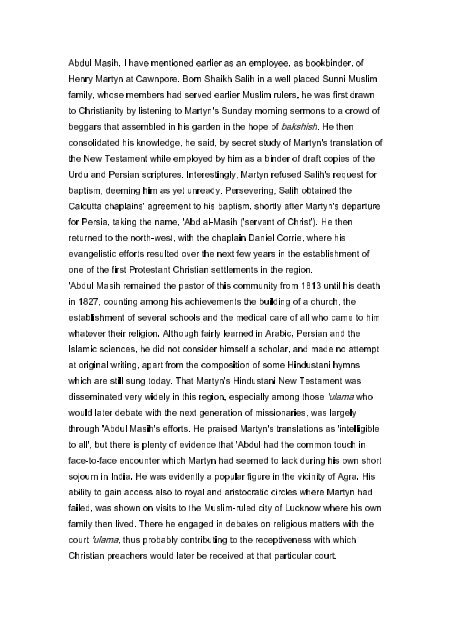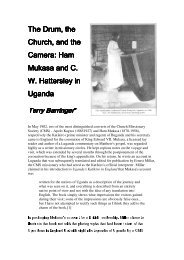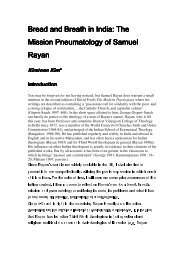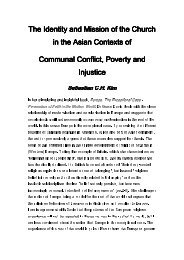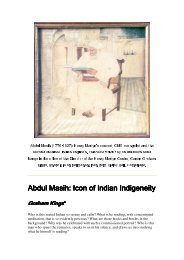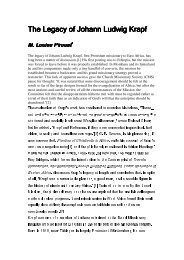the legacy of henry martyn to the study of india's muslims and islam ...
the legacy of henry martyn to the study of india's muslims and islam ...
the legacy of henry martyn to the study of india's muslims and islam ...
You also want an ePaper? Increase the reach of your titles
YUMPU automatically turns print PDFs into web optimized ePapers that Google loves.
Masih, I have mentioned earlier as an employee, as bookbinder, <strong>of</strong> Henry Martyn at Cawnpore. Born Shaikh Salih a well placed Sunni Muslim family, whose members had served earlier Muslim rulers, he was first drawn <strong>to</strong> Christianity by listening <strong>to</strong> Martyn's Sunday morning sermons <strong>to</strong> a crowd <strong>of</strong> beggars that assembled in his garden <strong>the</strong> hope <strong>of</strong> bakshish. He <strong>the</strong>n Abdul<br />
his knowledge, he said, by secret <strong>study</strong> <strong>of</strong> Martyn's translation <strong>of</strong> <strong>the</strong> New Testament while employed by him as a binder <strong>of</strong> draft copies <strong>of</strong> <strong>the</strong> Urdu <strong>and</strong> Persian scriptures. Interestingly, Martyn refused Salih's request for baptism, deeming him as yet unready. Persevering, Salih obtained Calcutta chaplains' agreement <strong>to</strong> his baptism, shortly after Martyn's departure consolidated<br />
Persia, taking <strong>the</strong> name, 'Abd al-Masih ('servant <strong>of</strong> Christ'). He <strong>the</strong>n returned <strong>to</strong> <strong>the</strong> north-west, with <strong>the</strong> chaplain Daniel Corrie, where his evangelistic efforts resulted over <strong>the</strong> next few years in <strong>the</strong> establishment <strong>of</strong> for<br />
<strong>of</strong> <strong>the</strong> first Protestant Christian settlements in <strong>the</strong> region. 'Abdul Masih remained <strong>the</strong> pas<strong>to</strong>r <strong>of</strong> this community from 1813 until his death in 1827, counting among his achievements <strong>the</strong> building <strong>of</strong> a church, <strong>the</strong> establishment <strong>of</strong> several schools <strong>and</strong> <strong>the</strong> medical care <strong>of</strong> all who came <strong>to</strong> him whatever <strong>the</strong>ir religion. Although fairly learned Arabic, Persian <strong>and</strong> <strong>the</strong> one<br />
sciences, he did not consider himself a scholar, <strong>and</strong> made no attempt<br />
original writing, apart from <strong>the</strong> composition <strong>of</strong> some Hindustani hymns which are still sung <strong>to</strong>day. That Martyn's Hindustani New Testament was disseminated very widely in this region, especially among those 'ulama who would later debate with <strong>the</strong> next generation <strong>of</strong> missionaries, was largely Islamic<br />
'Abdul Masih's efforts. He praised Martyn's translations as 'intelligible<br />
all', but <strong>the</strong>re is plenty <strong>of</strong> evidence that 'Abdul had <strong>the</strong> common <strong>to</strong>uch face-<strong>to</strong>-face encounter which Martyn had seemed <strong>to</strong> lack during his own short through<br />
in India. He was evidently a popular figure in <strong>the</strong> vicinity <strong>of</strong> Agra. His ability <strong>to</strong> gain access also <strong>to</strong> royal <strong>and</strong> aris<strong>to</strong>cratic circles where Martyn had failed, was shown on visits <strong>to</strong> <strong>the</strong> Muslim-ruled city <strong>of</strong> Lucknow where his own family <strong>the</strong>n lived. There he engaged in debates on religious matters with <strong>the</strong> court 'ulama, thus probably contributing <strong>the</strong> receptiveness with which sojourn<br />
preachers would later be received that particular court. Christian


